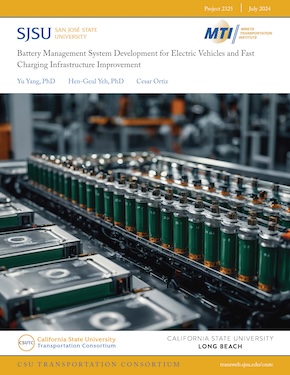- 408-924-7560
- mineta-institute@sjsu.edu
- Donate
Battery Management System Development for Electric Vehicles and Fast Charging Infrastructure Improvement
The electric vehicle (EV) has become increasingly popular due to its being zero-emission. However, a significant challenge faced by EV drivers is the range anxiety associated with battery usage. Addressing this concern, this project develops a more efficient battery management system (BMS) for electric vehicles based on a real-time, state-of-charge (SOC) estimation. The proposed study delivers three modules: (1) a new equivalent circuit model (ECM) for lithium-ion batteries, (2) a new SOC estimator based on the moving horizon method, and (3) an on-board FPGA implementation of the classical Coulomb counting method for SOC estimation. The research team extends the traditional ECM by incorporating more functional features through the least absolute shrinkage and selection operator (LASSO). Then the first-order transfer function model identification and LASSO are iteratively executed to minimize the data fitting error. Given this model, the research team employs the moving horizon estimator (MHE) to determine the SOC by fitting the measured terminal voltage. Subsequently, the research team implements the SOC estimation scheme on an FPGA board. This hardware-in-the-loop simulation is demonstrated in this report step by step. The proposed research has broad societal impacts. It aligns with SB1 objectives in several ways. First, EVs with a more efficient BMS can improve their cruise range, reducing energy consumption and traffic congestion. Second, the resulting BMS can be applied in the solar-power and battery-assisted charging stations to make more reliable infrastructure in an age of sustainable transportation.
YU YANG, PHD
Dr. Yang received his BSc degree from Beijing Institute of Technology, Beijing, China, in 2004; his MSc degree from Zhejiang University, Hangzhou, China, in 2007; and his PhD from the Department of Chemical Engineering, University of Alberta, Edmonton, Canada, in 2011. He then became a postdoctoral associate at the Massachusetts Institute of Technology. He is an associate professor in the Department of Chemical Engineering at California State University, Long Beach. His research interests include data-driven modeling, advanced process control, machine learning, global optimization under uncertainty, and the analysis and design of renewable energy systems.
HEN-GEUL YEH, PHD
Dr. Yeh received his BSc degree in engineering science from National Chen Kung University, Taiwan, ROC in 1978; his MSc in mechanical engineering from the University of California, Irvine in 1979; and PhD in electrical engineering, also from the University of California, Irvine in 1982. Since 1983, he has been with the Electrical Engineering Department at CSULB and has served as the Department Chair from 2016 to 2022. In addition to his technical and engineering excellence, he was selected as a NASA JPL Summer Faculty Fellow in both 1992 and 2003 and the Boeing Welliver Faculty Fellow in 2006. His research interests include DSP/Communication/Control algorithms development using MATLAB and their implementation using FPGA. He is also interested in digital signal processors with applications in communication systems, smart grids, optimization, controls, and electrical event detection, with a focus on real-time digital signal processing, Wi-Fi and Wi-MAX, adaptive systems, and mobile communication in multipath fading channels. He has published over 100 research papers on signal processing, communications, controls, and smart grids.
CESAR ORTIZ
Cesar Ortiz transferred to California State University, Long Beach in the fall of 2017 to pursue a bachelor’s degree in electrical engineering and sought a hiatus to embed himself in the labor industry in 2019. In the spring of 2022, Cesar returned to his studies with a revitalized perspective. Currently, under the guidance of Dr. Yu Yang and Dr. Hen-Guel Yeh, Cesar is working with Digital Signal Processing (DSP) and its applications using MATLAB, Simulink, and FPGA. His research interests include DSP/Communication/Control algorithms development using MATLAB.
-
Contact Us
San José State University One Washington Square, San Jose, CA 95192 Phone: 408-924-7560 Email: mineta-institute@sjsu.edu






